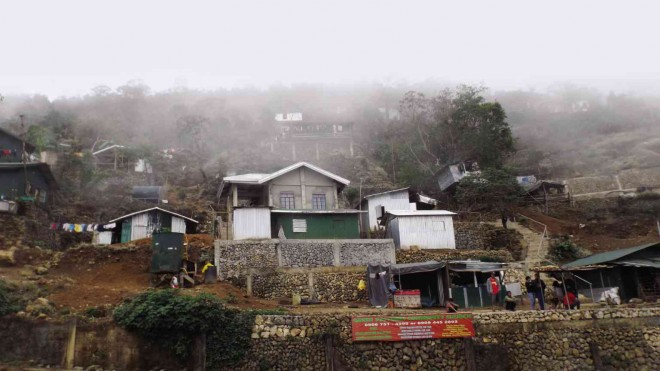300 houses face demolition in Baguio

SHANTIES and concrete structures with well-engineered foundations are rising inside Baguio Dairy Farm, which prompted the governments of Baguio City and Tuba town in Benguet province to inspect the area and to prepare for a demolition.CONTRIBUTED PHOTO
BAGUIO CITY—The local governments of Baguio and neighboring Tuba town in Benguet province are preparing to remove more than 300 illegally built houses from a government reservation here.
Agriculture Secretary Proceso Alcala had gone to court to save the century-old Baguio Dairy Farm, where squatter families have settled.
During a visit in La Trinidad town in Benguet in February, Alcala said he inspected the 96-hectare dairy farm and discovered that families have lived there without securing permits from the government.
“We asked the Office of the Solicitor General to handle the legal action we would take to contain [this invasion by squatters that began in 2014],” Alcala said.
A task force formed by Baguio and Tuba confirmed that more than 300 houses have risen there without permits, among these owned by businessmen who bought lots that were part of an ancestral land title, a task force member said on Monday. The source asked not to be named, citing security concerns.
Article continues after this advertisementInformed about the task force’s findings, Baguio Mayor Mauricio Domogan said the illegal settlers would receive demolition notices from the city and from Tuba. Some structures, he said, crossed into Tuba’s boundary with Baguio.
Article continues after this advertisementMarilyn Sta. Catalina, Department of Agriculture (DA) Cordillera regional director, said the DA has been serving as the farm’s custodian since the 1940s when Commonwealth President Manuel Quezon segregated the area for government animal breeding.
But the National Commission on Indigenous Peoples awarded 75 ha of the farm to an Ibaloy family in 2010. The settlements, Domogan said, are on the Ibaloy ancestral land, which became accessible through roads opened by heavy machinery and built without permits.
Sta. Catalina said DA drew up a development plan to improve the dairy farm, partly to address complaints that the government land had been idle for too long.
In the 1990s, the DA and the Department of Agrarian Reform (DAR) fought over the farm, after a DAR adjudicator validated an agrarian reform application over the area. In the same decade, a group of militiamen staked a claim on the area as its home lot.
The dairy farm was also proposed as the site of a bus terminal for Baguio.
In 2012, the regional law enforcement coordinating committee investigated reports that militiamen from a faction of the Cordillera People’s Liberation Army had acquired some lands in the area.
Land inside the dairy farm had been sold several times, according to the task force.
Domogan directed the city legal office to track down the original occupants of the houses at the DA reservation.
He said the settlers also sent the city government a resolution stating that they will not leave the area unless they are directed by a court. Vincent Cabreza, Inquirer Northern Luzon